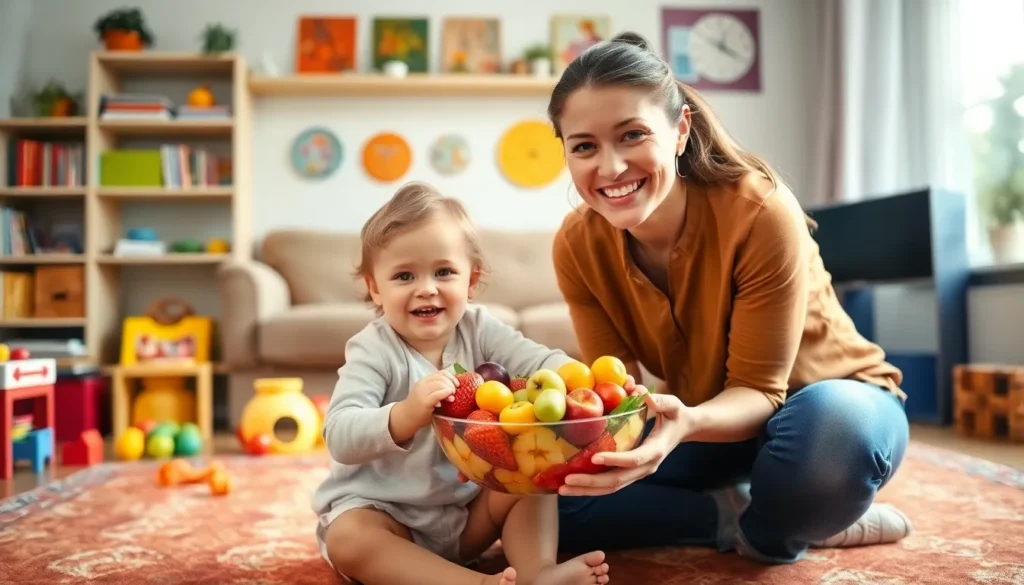Table of Contents
ToggleParenting can feel like a high-stakes game of chess, where every move counts and the opponent is a tiny human with a penchant for tantrums. With the right strategies, though, parents can navigate this chaotic battlefield and come out victorious. From mastering the art of negotiation over bedtime to turning broccoli into a superhero sidekick, success in parenting is all about creativity and a sprinkle of humor.
In this article, readers will discover tried-and-true tactics that can transform everyday challenges into teachable moments. Whether it’s establishing routines that stick or fostering a home environment that encourages growth, these parenting strategies are designed to empower and inspire. So grab your favorite snack and get ready to unlock the secrets of successful parenting—because who said raising kids can’t be a little fun?
Understanding Parenting Success Strategies
Parenting success strategies encompass various approaches that enable caregivers to navigate challenges effectively. Establishing routines lays a strong foundation for children. Consistent schedules help kids feel secure and understand expectations, which is crucial for their development.
Creativity plays a vital role in problem-solving during daily situations. Finding fun ways to handle tasks, like bedtime, transforms conflicts into engaging moments. For instance, turning healthy eating into a fun activity encourages children to make better food choices.
Communication holds significant importance in fostering healthy relationships. Encouraging open dialogue makes children feel valued and strengthens family bonds. Listening actively to their thoughts promotes mutual respect.
Setting clear boundaries is essential for developing self-discipline in children. Firm guidelines offer a sense of safety, while also teaching responsibility. When expectations are clear, children are more likely to meet them.
Positive reinforcement boosts confidence and motivates children. Recognizing achievements, big or small, reinforces desired behaviors. This strategy promotes a growth mindset, emphasizing the value of effort over perfection.
Creating a supportive environment allows children to flourish. Encouragement from parents nurtures resilience and independence. Additionally, parental modeling of emotional regulation equips children with vital coping skills.
Building connections with other parents fosters a sense of community. Sharing experiences and collaborating on solutions provides reassurance and resources. Networking with peers offers fresh perspectives on parenting challenges.
Adopting these strategies effectively transforms parenting into a rewarding experience. Understanding these techniques empowers caregivers to navigate the complexities of raising children with confidence and enjoyment.
Effective Communication Techniques

Effective communication builds strong parent-child relationships. Utilizing specific techniques can enhance understanding and connection.
Active Listening
Active listening engages both parents and children in meaningful conversations. It involves focusing on the speaker without distractions. Parents show attentiveness by maintaining eye contact and nodding in acknowledgment. Responding with brief verbal affirmations encourages children to share their thoughts. Practicing reflection by paraphrasing what a child says validates their feelings and promotes deeper discussions. Prioritizing this technique fosters trust and openness in communication.
Encouraging Open Dialogue
Encouraging open dialogue creates a safe environment for children. Parents can initiate conversations about various topics, allowing children to express their opinions freely. Asking open-ended questions invites thoughtful responses and minimizes one-word answers. Creating no-judgment zones helps children feel secure in sharing their thoughts. Regular family meetings can reinforce the habit of open communication. Prioritizing this technique strengthens family bonds and enhances emotional intelligence in children.
Building Emotional Intelligence
Building emotional intelligence in children enhances their self-awareness and interpersonal skills. Parents play a crucial role in guiding this development.
Recognizing Emotions
Recognizing emotions starts with naming and identifying feelings in oneself and others. Children benefit from using a feelings chart that displays various emotions. Awareness increases when parents model their emotions transparently during daily interactions. Conversations about how a child feels during specific situations promote understanding. Engaging in role-playing activities allows children to practice identifying emotions in different scenarios. Reinforcement strengthens this skill, making it easier for children to articulate their feelings.
Teaching Empathy
Teaching empathy starts with helping children understand others’ perspectives. Discussing books or movies cultivates empathy, as kids learn about different characters and their feelings. Parents can encourage children to ask questions about how others might feel in various situations. Experiences, such as volunteering or sharing, provide opportunities for children to practice empathy in real life. Role-play scenarios add fun while enabling kids to navigate social interactions. Reinforcing empathetic responses leads to a deeper appreciation of emotional connections.
Establishing Routines and Boundaries
Establishing routines and boundaries significantly influences child development. Routines create a safe environment where children understand what to expect daily.
Importance of Consistency
Consistency in routines develops a sense of security. Children feel more confident when they know what comes next. Repeated actions reinforce positive behaviors, cultivating trust between parent and child. Regular mealtimes, bedtime rituals, and designated homework periods help children learn time management skills. Parents can refer to various studies showing that consistency boosts a child’s emotional regulation and resilience.
Setting Clear Expectations
Clear expectations guide children’s behavior. Parents should communicate their requirements explicitly and positively. For instance, stating “Please pick up your toys” rather than “Don’t leave your toys out” sets a directive tone. When children understand what’s expected, compliance becomes easier. Reinforcement of these rules through consistent feedback fosters accountability. Positive outcomes emerge from children meeting these expectations, encouraging them to internalize appropriate behaviors.
Positive Reinforcement and Discipline
Positive reinforcement plays a critical role in shaping children’s behavior. It encourages desired actions by recognizing and rewarding good conduct. Positive outcomes lead children to repeat those actions in the future.
Rewarding Good Behavior
Rewarding good behavior establishes a foundation for children’s positive actions. Parents can utilize various incentives like praise, small rewards, or extra privileges. Recognizing achievements, whether big or small, reinforces self-esteem and motivation. Consistent positive feedback strengthens the connection between behaviors and rewards. For instance, using a sticker chart can track progress and create excitement around meeting goals. Celebrating milestones together also enhances family bonds and encourages ongoing effort.
Constructive Discipline Approaches
Constructive discipline focuses on teaching rather than punishing. Effective discipline strategies guide children toward understanding the consequences of their actions. Parents might implement time-outs to allow reflection on behavior. Additionally, discussing choices and consequences empowers children to make better decisions. Using natural consequences fosters accountability and growth. Keep in mind that maintaining a calm demeanor during discussions helps children process emotions and learn self-regulation. Active engagement in discipline methods promotes a nurturing environment where children feel supported.
Parenting is a journey filled with challenges and opportunities for growth. By embracing creativity and humor caregivers can transform daily struggles into meaningful experiences. Establishing routines and clear expectations not only provides structure but also fosters emotional resilience in children.
Open communication and positive reinforcement are essential tools for building strong family bonds and encouraging self-discipline. As parents navigate this complex landscape they can draw strength from community connections and shared experiences.
Implementing these strategies empowers caregivers to cultivate a nurturing environment that promotes independence and emotional intelligence. Through patience and dedication it’s possible to raise confident and well-adjusted children ready to face the world.







